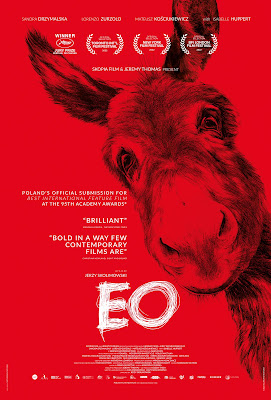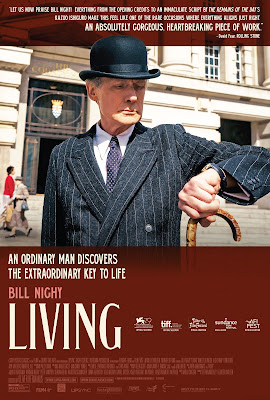Review | EO/Living | 2022

Despite the fact that remakes are not exactly scarce these days, it's still fairly rare to see a classics of world cinema like Akira Kurosawa's Ikiru or Robert Bresson's Au Hasard Balthazar get the remake treatment, let along two in as many months. While not technically a remake, Polish filmmaker Jerzy Skolimowski's EO takes heavy inspiration from Balthazar, while Oliver Hermanus' living is a more straightforward remake of Ikiru.
Both films arriving in such quick succession is serendipitous of course - but it's fascinating to observe the differing ways in which both deviate and misunderstand their inspirations. EO, for instance, almost plays out like Balthazar fan fiction, with avant-garde flourishes that pull Bresson's haunting stillness into a more colorful but less compelling territory. The story is essentially the same - a donkey passes from owner to owner and witnesses the world at its most beautiful and its most vile. The donkey acts as our guide and his innocence provides a counterpoint to both the acts of cruelty and the acts of kindness he encounters along his path. It is ultimately an allegory for the human condition, the animal's guilelessness puts his suffering on a Christ-like path. While the donkeys in both films meet similar fates, Skolimowski's vision feels less spiritual and more fatalistic. It's less journey of the soul and more Theatre of Cruelty. And while this is clearly the 84 year old Skolimowski grappling with mortality, Eo's journey feels bizarrely mean-spirited in a way Balthazar's never did.Living is likewise a more dour affair than Kurosawa's film. Bill Nighy steps in for Takashi Shimura as a man know simply as Mr. Williams, a mid-ranking government bureaucrat whose life as a cog in a slow-moving, inefficient wheel takes on a new urgency when he discovers that he only has a few months to live. He then sets about spending those months unclogging the system to pave the way for a long gestating playground project that had been caught in the gummed up works of his office. It's a small act, but one that has a greater impact on the world around him than his monotonous existence ever had before. That quest for meaning is what makes Ikiru such a universal film that still resonates deeply.
Hermanus bulldozes Kurosawa's delicate humanity for something that feels desperate for its audience to feel something, anything. If it weren't for the quiet dignity of Nighy's central performance, the film would be almost laughably overwrought, burying its big emotional moments with sweeping music cues that feel entirely too much for their respective scenes. Nighy is strong but the character doesn't have much room to breathe under all the moping. This is, of course, part of the conceit - Mr. Williams is essentially a non-person by design. But Living feels oppressive even when its trying to inspire, and like EO, it tries to build on a foundation that didn't;t need any improvement to begin with. Opposing the very idea of remakes at this point feels as old hat as the remakes themselves, but neither Living or EO bring enough new ideas to the table, to warrant a second trip to the well.EO - ★★ (out of four)
LIVING - ★★ (out of four)
EO | Directed by Jerzy Skolimowski | Stars Sandra Drzymalska, Lorenzo Zurzolo, Mateusz Kościukiewicz, Isabelle Huppert | In Polish w/English subtitles | Now playing in limited release.
LIVING | Directed by Oliver Hermanus | Stars Bill Nighy, Aimee Lou Wood, Alex Sharp, Tom Burke | Rated PG-13 for some suggestive material and smoking | Opens December 23 in limited release.




Comments